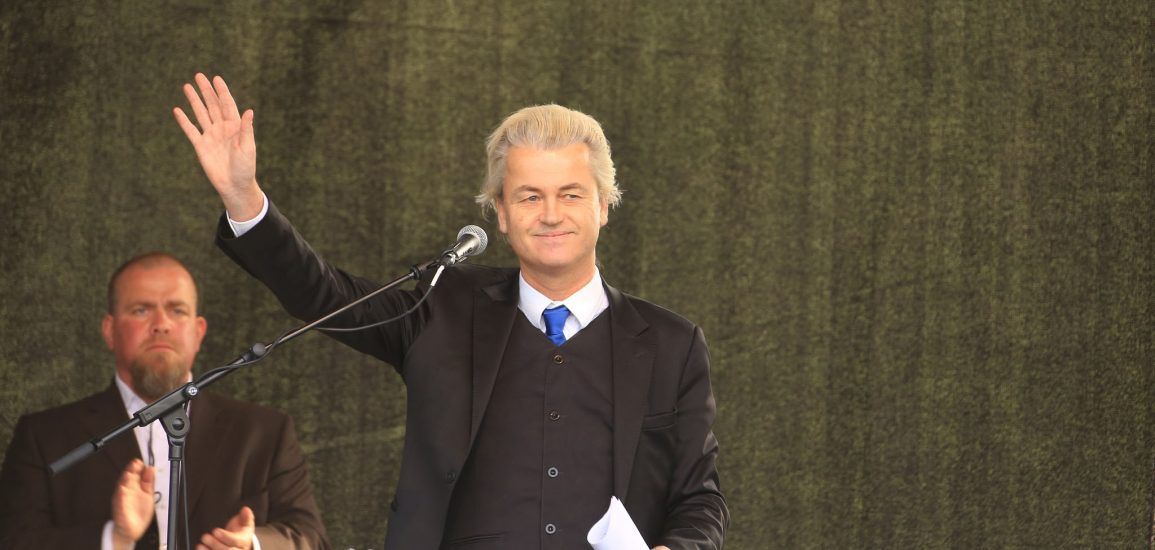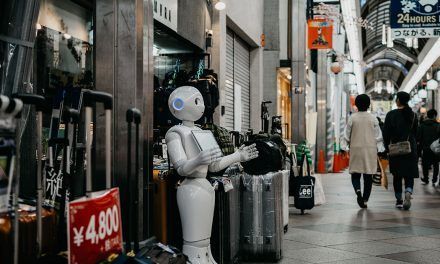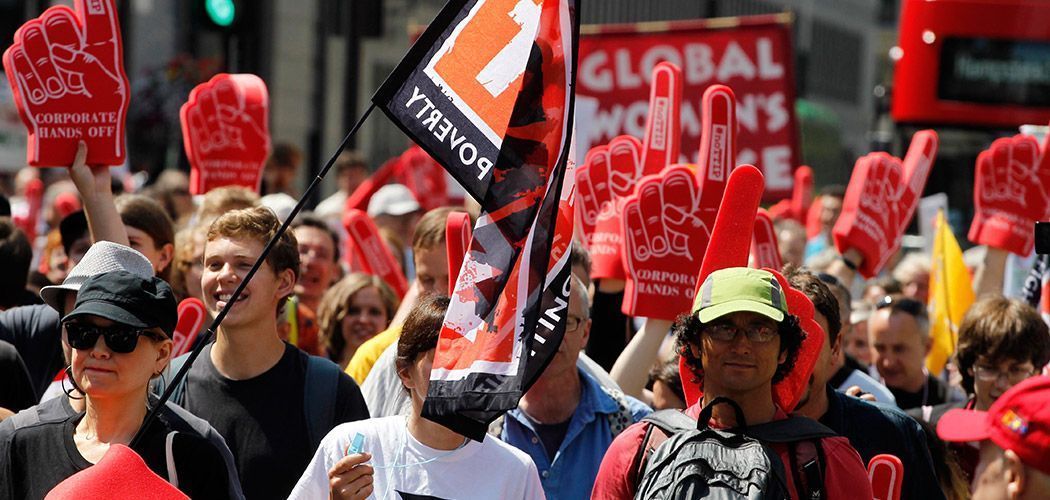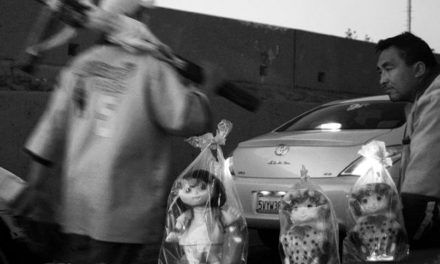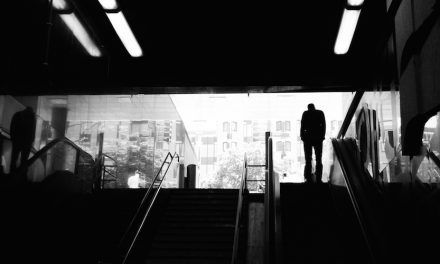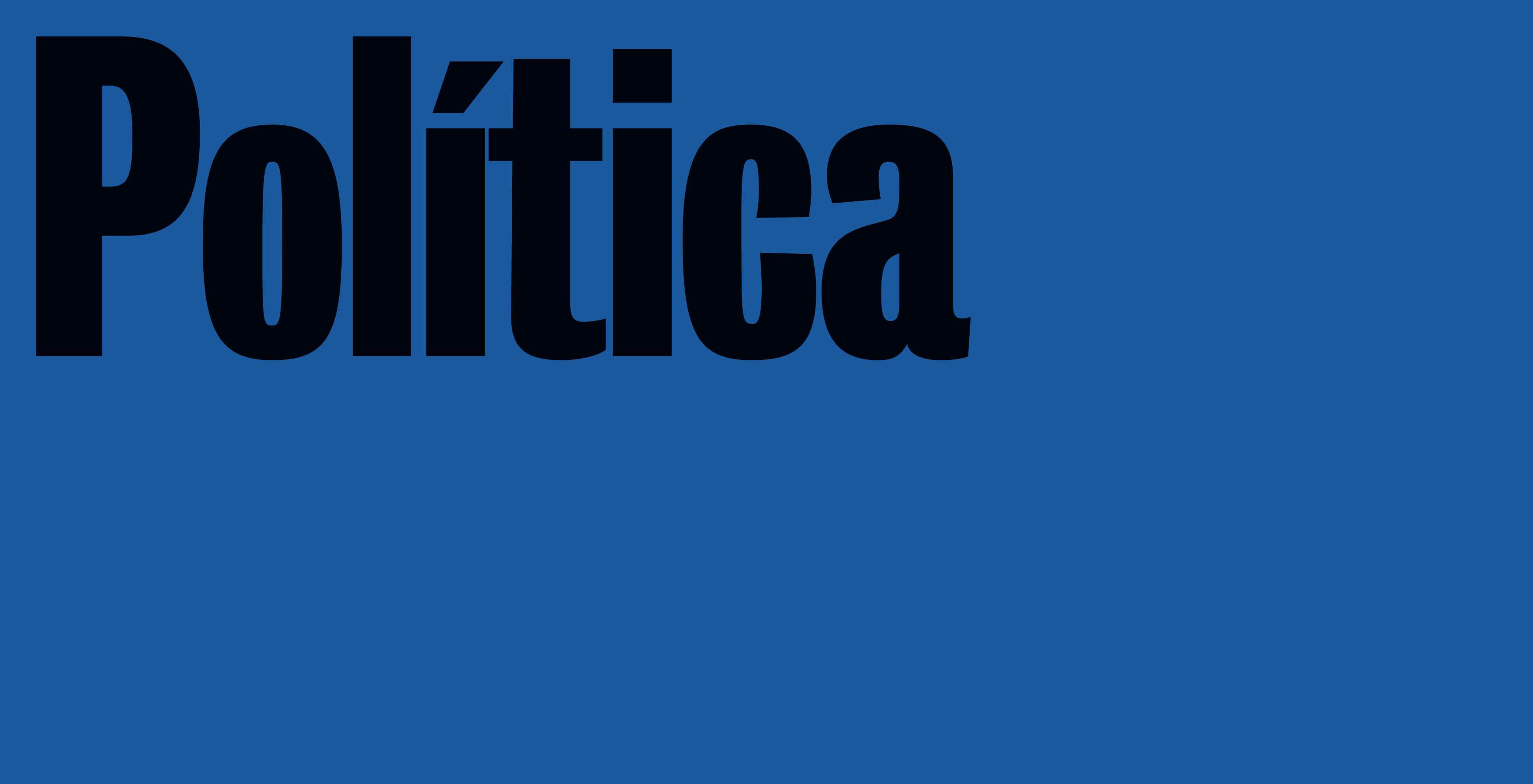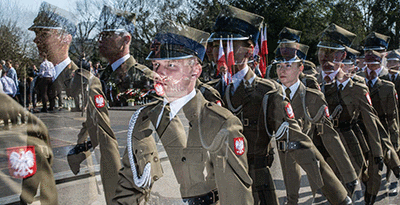2016 was a shocker for political pundits and the public alike. Brexit kicked the EU’s door down and Donald Trump’s surprise win shook up the United States. Both events seemed to point to one thing: the populist wave now set to sweep across Europe and gobble up previously stalwart countries like France and the Netherlands.
Now the Dutch elections are coming up and all eyes are on Geert Wilders, an anti-establishment politician from minute one and “the Dutch Donald Trump”, according to British newspaper the Sun. Like the Donald, Wilders sports an outrageous blonde hairstyle, married an Eastern European woman, and wants to ban Muslims from his country (he does not live in a golden tower, though).
A victory for Wilders’ PVV (Party for Freedom) on March 15th could be a major shift in the political landscape. Wilders is more radical in his views than Nigel Farage and Marine Le Pen put together and more consistently anti-immigration than Donald Trump. Not only has he promised to shut the borders, he also wants to ban the Quran and all mosques (thus requiring a rewrite of the Dutch constitution). As for the EU, the promised Nexit could be the next step in its dissolution.
It comes as no surprise that reporters from all over the world are now interviewing people in the streets of Volendam and Alkmaar , hoping to get a scoop on the next populist landslide. But does Wilders really have the power to decide Europe’s fate for the next few years?
According to the polls, no party will obtain the support of more than 15 – 20% of the electorate
Unlike the Brexit referendum or the US presidential election, the Dutch elections are not a case of winner-takes-all. There are more than two options on the ballot (28 parties and hundreds of candidates for parliament, in fact). All the parties run for a share of the seats in parliament and the largest faction wins the initiative to put together a coalition government (and usually retains the right to provide the prime minister). Sounds simple in theory, but in practice forming the next Dutch government could prove a true Gordian Knot. There are 150 parliamentary seats to be won, but to form a government a party needs to win 76 of them, just over 50% of the vote (which never happens).
According to the polls (Figure 1), no party will obtain the support of more than 15 – 20% of the electorate. That includes Wilders and his PVV, who seem to be stuck at a predicted 19 – 23 seats and declining. What does that mean for the outcome? And if Wilders does not win, what should an observer take away from this election instead?
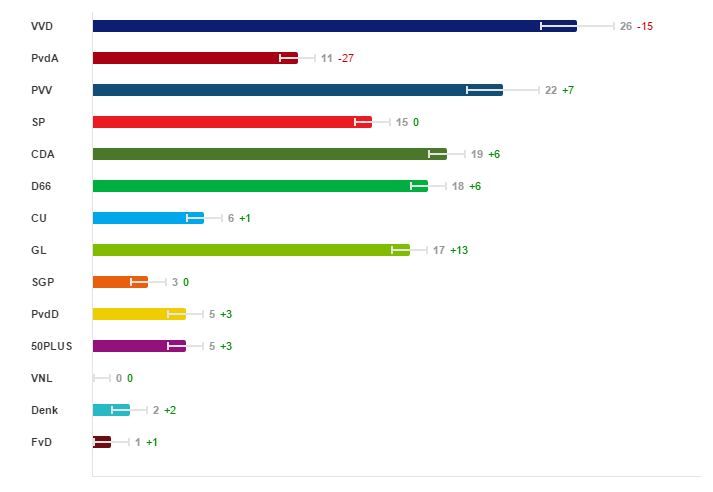
Figure 1. Source: NOS. The red and green numbers are the comparison with the last election.
Lone wolf under a Turkish moon
In the last few weeks and days before the election, things have been quiet on Wilders’ side. Very quiet.
In stark contrast with the amount of attention he’s been getting internationally, Wilders has been mostly absent during the campaign. In the rare interviews he’s given he either talked about his cats or panned the ‘leftist hate media’. He also cancelled debates and television appearances at the last moment and suspended live appearances, following concerns about possible leaks to a criminal organization by a member of his security team – the men in black that for the last decade have guarded him from the death threats he receives in response to his outings about Islam.
Erdogan went as far as saying that the Dutch government is “full of Nazi remnants”
The main place where Wilders can be found is on Twitter, weighing in, for example, on the latest diplomatic crisis between the Hague and Ankara. On the Saturday before the election, the Dutch government deported the Turkish minister Fatma Betul Sayan Kaya to prevent her from campaigning in the Netherlands in support of a referendum that would expand the powers of president Erdogan. Although Dutch citizens with the Turkish nationality are eligible to vote in the referendum , the government had previously made a statement that it would not tolerate the campaign on Dutch territory.Erdogan has reacted furiously, calling the Netherlands a “banana republic” that iss “full of Nazi remnants”.
You’d expect this spat with an Islamic country to be good timing for Geert Wilders. But while he has dedicated almost all his tweets to the issue over the last few days, there’s no denying that most of the attention has gone to Mark Rutte, the current Dutch prime minister and Wilders’ biggest rival in the elections.
Both men have done their utmost to turn the election into a man-to-man leadership contest. The only TV debate Wilders has agreed to appear on is the one in which he faced the PM alone – just two nights before the election. A few weeks ago, it seemed like the PVV and Rutte’s neoliberal People’s Party for Freedom and Democracy (VVD) might go head to head in the race, but lately it seems like Rutte is taking a more comfortable lead (although ‘lead’ must be understood relatively – in 2012 the VVD won 41 seats, against 23–27 seats predicted this time around).
Will a television debate 36 hours before the election be enough to turn things around?
The Dagelijkse Standaard or DDS (a website best compared to a Dutch version of Breitbart, in terms of its hateful content and disregard for facts) claims the Turkish incident is a ploy by Rutte to sabotage Geert Wilders days before the election. According to DDS, the Dutch government had appealed to the Turkish ministers to delay their campaign until after the elections. In their version of the story, Rutte’s top priority was preventing “hundreds of thousands of Turks taking to the street and waving Turkish flags before the 15th of March. After [the elections], they could do whatever they wanted”,
A case of fake news, most likely — its sources are BILD, a German gossip paper, and the Turkish minister of foreign affairs Mevlüt Cavusoglu, who was also banned from campaigning in the Netherlands. But even if you were inclined to believe the story, there’s little doubt that the crisis hasn’t harmed Rutte but proves to be good timing for him. While Rutte gets credit for his decisive dealing with the diplomatic falling out, Wilders can’t do much but take to his twitter feed. He organized a demonstration a couple of days ago, in front of the Turkish embassy, but not many people turned out and the mainstream media paid little attention.
This has been symptomatic for his campaign in general: Wilders has remained in the background and discovered that beating a sitting prime minister in the polls is not as easy, thanks to the power of incumbency. Will a television debate 36 hours before the election be enough to turn things around?
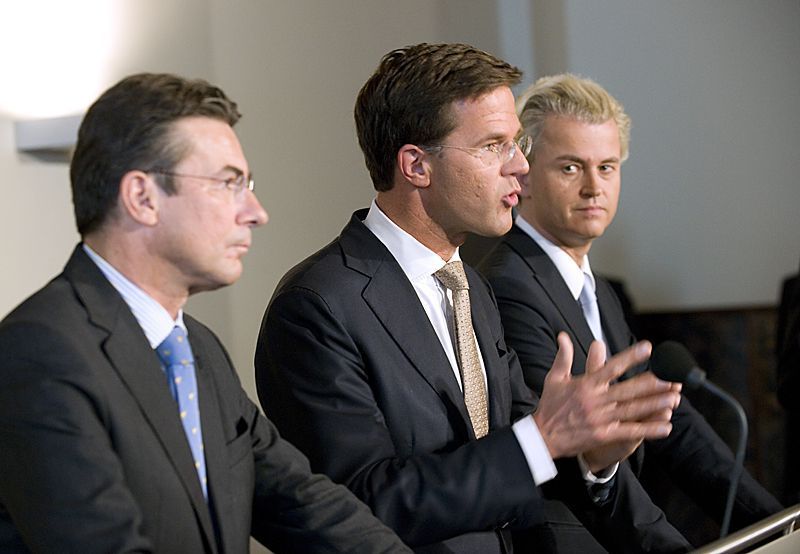
Mark Rutte (VVD), Maxime Verhagen (CDA) and Geert Wilders (PVV). Source: Flickr.
Where is Geert?
Over the last month, PVV has been sliding in the polls. A win over VVD looks more unlikely than it did just weeks ago. Granted, polls have been wrong in both the Brexit and the American cases. But they were never off more than a few percentage points, and currently Wilders is hovering around 13% of the vote. So, why hasn’t Wilders been more present on the campaign trail?
Some analysts think Wilders’ underwhelming campaign is the result of a lack of funds and manpower and of bad luck, like when uncertainty around Wilders’ security detail kept him from making live appearances. Others believe that Wilders has deliberately been lying low and avoiding the confrontation with other party leaders until the last days of the campaign, when he’ll take the country by storm. He is supposedly maximizing the appeal of being the political outsider and showing his supporters that he doesn’t operate by the rules of the mainstream media and established elites.
Playing the political underdog might also be Wilders’ way of responding to the other major political parties, almost all of whom – Rutte and the VVD included – have said that they will not work with the PVV on grounds of Wilders’ discriminatory outings about Muslims (true to form, Wilders kicked off his campaign by calling Moroccans “scum”). This means that Wilders has no chance of being part of the next coalition government, since even if he wins the biggest share of the vote, he will not find anyone willing to form a coalition with him to occupy the required 76 seats.
No one spends 19 years in national politics without becoming a man with baggage
Wait. Could it be that Wilders never really intended to rule at all?
Let’s be clear: in a lot of ways, Wilders isn’t what he makes himself out to be. He acts like the political outsider, but has been a member of parliament since 1998 – initially for the VVD, and since 2004 as the leader of his own PVV. He promises to “make the Netherlands ours again”, but will never give any details of how he means to achieve this. When pushed, he says he just doesn’t care. He wants to stop all refugees from coming to the Netherlands, but he is also a man who adopts stray cats. When he’s not busy leading a witch hunt for Polish workers, he loves riding the pastel-coloured, floating fairy-tale ride in the Netherlands most famous theme park, de Efteling.
No one spends 19 years in national politics without becoming a man with baggage. In Wilders’ case these are his distaste for the media, his increasingly radical ideas and that time his party was (sort of) part of the government in 2012. It all ended in tears when the PVV blew up negotiations about austerity measures and toppled Mark Rutte’s first cabinet in the process.
Fragmented, not polarized
All things considered, it is highly unlikely Geert Wilders will be prime minister after the elections. He may not be leading the biggest (or even the second biggest) party. But perhaps it doesn’t matter if he doesn’t win. His rise has directly contributed to another and maybe more dramatic shift in the political landscape.
Readers adding up the numbers throughout this article will have noticed that they don’t make much sense: both PVV and VVD remain way too small to have a shot at forming a coalition government without at least three or four other partners (at 25 seats each and ruling out each other, they’d need to find 51 seats across other, more collaborative parties). While the Netherlands has always had coalition governments, the leading party being this small is unprecedented, meaning we’re up a creek without a paddle.
The problem is that, most likely, partners are predicted to win about 16 to 20 seats at best. The country hasn’t become polarized, in the sense of there being two groups (populists and non-populists or globalists and nationalists): it’s fragmented, with six or seven different contenders of roughly equal size.
Even if Wilders loses, perhaps voters will be so displeased that they seek more extreme alternatives in the future
The formation period after the elections is already promising to be extremely chaotic. Newspapers reportthat civil servants in the Hague are already discussing the likelihood of new elections. Meanwhile, the social democrats (PvdA), previously a mainstay of Dutch politics, have been as good as wiped out: being the VVD’s coalition partner has cost them dearly, their supporters unhappy about austerity measures to tackle the financial crisis.
However, I can’t help but think these developments are part of a broader trend across Europe. Labour in the UK ―just to put an example of the many crises that social democratic parties in Europe are undergoing at the moment― is suffering from similar problems as the PvdA, mainly caused by their failure to come up with a convincing story about Europe or pressing problems such as the climate or employment, or innovation or foreign affairs. Instead, they’re letting themselves get trapped by the likes of Farage and Wilders into a debate almost exclusively about immigration and integration – like a kind of nightmare vortex you can’t escape.
Could this election lead to an antiimmigration government or even a Nexit? Perhaps. Even if Geert Wilders loses, perhaps voters will be so displeased about the inevitable watered-down coalition that they seek more extreme alternatives in the future.
But not all is doom and gloom. The demise of PvdA and the other centrist parties combined with the likely failure of the PVV to be a serious candidate for government has also freed up room to grow for parties who were small or even marginal before. And these are no populist alternatives according to the Wilders model: there’s the EU-loving D66, the Greens, and even the Party for the Animals,which might turn out to be the greatest electoral surprise of all, or 50Plus – catering solely to pensioners. Nothing is certain about this election, but the only thing that’s safe to say is that this isn’t over yet.

